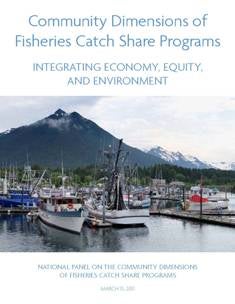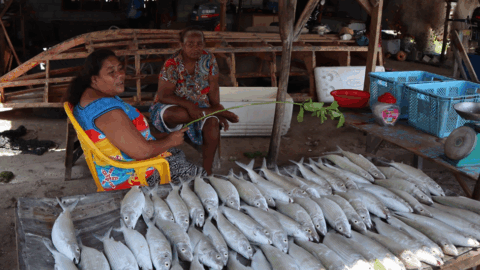National Panel Releases Recommendations on Communities and Catch Share Policy

A national panel on “the Community Dimensions of Fisheries Catch Share Programs” released its recommendations today. The Panel, convened by Ecotrust, found that options for improving communities and fisheries explode under catch shares, but they don’t happen on their own and more work and energy are needed to fully exploit the benefits of catch shares.
Overall, the panel’s findings are good news for communities that have suffered under traditional fisheries management. Its findings highlight how well-designed catch shares benefit our fishing communities by enhancing economic development. Under catch shares, there is a menu of options that were never before available to fishing communities.
However, like our brains, we are only using a small percentage of catch shares’ potential. Fishermen and other stakeholders can and should learn from past experiences to better implement catch shares. There are myriad ways to design catch shares to maximize benefits for communities. Where these approaches are being used, such as the Cape Cod Fisheries Trust and a community fishing association in Central California, communities are benefiting. However, many more communities can benefit from these innovative approaches and in some cases, not all community-focused options have been used in the design of catch share programs.
Fishing communities, fishermen and other stakeholders have opportunities under catch shares that were never available under previous management. We encourage stakeholders to envision their future and design catch shares to achieve their specific goals. There are myriad options, including many of the recommendations highlighted in the Panel report and the Catch Share Design Manual.













5 Comments
Although communities are included in the definition of catch shares, there has been a notable lack of implementation of existing provisions for communities in the nation’s fisheries law.
Here are the Panel’s Recommendations:
Community-Based governance recommendations
➤ NOAA should seek approaches to support fishing communities in the development, expansion, and diversification of community-based initiatives.
➤ NOAA should require the development of Community Fishing associations (CFas), regional Fishing associations (RFAs) and other community structures now authorized in the MSA (Section 303a) within any catch share program.
➤ NOAA budgetary resources should be applied to further define and develop guidelines for implementation of the community provisions of the mSa to be applied by all fishery management councils.
Programmatic and Financial Innovation recommendations
➤ NOAA should develop a dedicated loan program to assist communities and new entrants in the purchase of catch shares, and to act as a reserve for existing or future programs that have excluded communities from the initial quota allocation.
➤ NOAA should require a significant and appropriate baseline percentage of fisheries quota be anchored in communities in each council region through entities like Community trusts, such as the Community quota entity program in alaska.
➤ Councils should design catch share programs to include predictable, performance-based renewals as an alternative to allocations in perpetuity.
➤ Catch share program design should include mechanisms such as quota auctions with revenue recycling into coastal communities, and other strategies to improve the effects of quota programs on long-term sustainability and community stability.
➤ NOAA and councils should ensure that standards and costs for monitoring are appropriately scaled to the size and income capacity of boats.
➤ NOAA should convene a working group of representatives from key federal and state financing programs (USDA, EDA, Treasury, SBA and HUD to formulate a funding initiative for CFAs, and to engage financial intermediaries in support of capacity building technical assistance and investment.
➤ NOAA should invest in the research and development of business models for new private financing mechanisms that promote its program goals, as well as the capacity of fishermen and communities to utilize these mechanisms.
Capacity recommendations
➤ Councils should establish baseline data and a system for socioeconomic monitoring of catch share programs so that a comprehensive understanding of how programs are working can be developed rather than relying on piecemeal evidence to date.
➤ Councils should require the effective participation of the fishing industry and communities in catch share program development from the beginning.
➤ NOAA should work within fisheries and look to other industries, such as pollution trading, to learn from other transparent trading and reporting mechanisms and apply those to catch share transactions using best available technology and expertise.
➤ NOAA should invest in new or additional capacity in catch share design expertise at the council staff level.
Concern for getting fish from the ocean needs to get centered on our ever-growing messes of organic wastes as they are starting to rot the oceans. Plastics are getting eaten by fish to kill them by clogging stomaches starving fish to death. Nodles, little plastic fragments, are clogging food intake and breathing tubes of shellfish and bivalves. In the Pacific gyre, reduced levels of phytoplankton were reported a few years ago, and that seems likely due to sunlight being converted to heat or deflected back to space by the enormous plastic garbage patch. With the conversion to heat or deflection, less sunlight is available for photosynthesizing species in the oceans. With reduced levels of phytoplankton the whole ocean food chain is curbed. Some areas especially Gulf of Mexico are being stressed by fertilizer runoff.
I suggest that EDF ought to put a lot of work into getting attention to the waste messes and not worry about catch programs as rotting oceans may soon be seeing severe or no catch limits being naturally imposed to the point that few fish and seafood are even caught. Those waste messes are a resoure for generating some energy and curbing the reemitting of GHGs, mainly CO2, that are formed by biodegradation. As I have pointed out in many blog comments, BIOWASRES are an already harvested biofuel supply system usurping no land or water or fertilizer from food crops. Dr. J. Singmaster, Fremont, CA
Kate, when you mention “other stakeholders” are you referring to the investors that were in attendance at the Milken Institute Conference in Los Angeles, April 2009, when David Festa assured them at least a 400% return on their catch share invested money? Catch shares which, by the way, were not approved and implemented by NMFS until June. What a financial visionary is your VP. Are these the opportunities you refer to that were never available under previous management?
If it’s investor capital opportunities you’re referring to, you are absolutely correct. Previously the fish always stayed with the license and the fishermen. Catch shares separate the fish from the fishermen and invite investment “Funds” to make some “real money”, as it was put at that conference, from a publically owned fish resource. Yes, what opprotunity! And it saves us all from the “tragedy of the commons”, as well. Actually, the real “tragedy of the commons” is that the resource has been stolen from the common people and awarded to the investor class.
The largest fishing port in Massachusetts, New Bedford, has two thirds of its fleet tied up for lack of catch share allocation. Only large fleet owners made out under the catch share system in New England and even some of the winners know how destructive to our industry this scheme will be, ultimately. Many small boat fishermen and some vital shoreside support businesses are already gone, with many others on the brink of bankruptcy. Is this the “menu of options” and benefits that catch shares afford to fishermen and fishing communities that were never before available?
Communities did not “suffer under traditional fisheries management” because of the TYPE of management; they suffered and still are and even more so today, because of unnecessarily low TAC’s due to inaccurate and stale stock assessment, spawned by negative PR campaigns, and politically driven hyperbolic “research” conclusions.
Days-at-Sea, hierarchical ecosystem with a point dis-incentive system, catch shares, input-output, closed spawning areas, makes no difference, it’s the TAC that controls fish mortality. Days-at-Sea at least do not commodify a publically owned resource for Wall Street and “Funds” like yours to play with, while creating economic havoc for the fishing communities.
Read and review the list of recommendations outlined in the previous writer’s comment and please state how many of these “opportunities” have been implemented for the fishing communities of Gloucester MA, New Bedford MA, Point Judith RI, Stonington CT, Montauk and Shinnecock NY, Point Pleasant and Cape May NJ, Hatteras NC, etc.
These “fishermen and their communities” are in big trouble not for lack of fish in the ocean, but because of your wonderful “options for improving communities and fisheries” that “explode under catch shares”. When revenues are honestly appraised by factoring in the new additional cost of first buying the fish before catching and landing them—which requires GAMBLING on the future market price thus adding another variable to the process—REVENUES ARE NOT UP! Many fishermen are winding up a trip in the red, because of a drop in prices which were higher when the poundage was purchased sometimes months in advance and, at best, fishermen are spending 40% to 80% of the ex-vessel revenue before they leave the dock. With very little financial liquidity in the system for most fishing businesses, THIS IS NOT A VIABLE SYSTEM FOR SMALL BUSINESS INDEPENDENT FISHERMEN!
Your organization has previously spun ECOTRUST’s research; it looks like you’re at it again.
Stop the Lies. Back up your Spin!
Dick Grachek, F/V Anne Kathryn, Point Judith RI
Wall St wants to create a fish bubble. They can OWN the fish & speculate-driving up the price for the consumer. When it bursts, the gov. will bail them out.
Catch Shares is Catch & Trade-just like Cap & Trade. A Ponzi-like scam to make banksters & investors rich.
EDF sufferd a punch this week with the SAFMC voting to cease all work related to catch shares,funny the only so called fisherman who want catch shares are rich fish house owners who want all the fish for themselves.You can count on this EDF has money but you don’t have the heart,the fisherman will prevail.